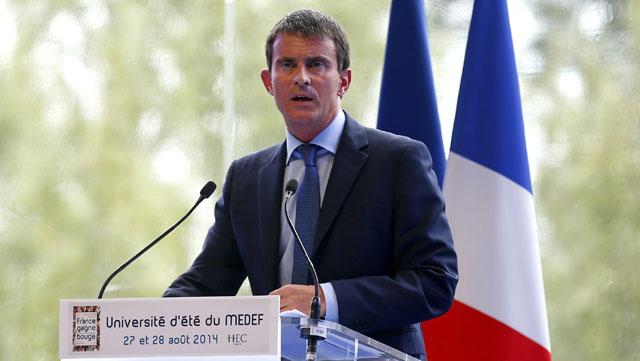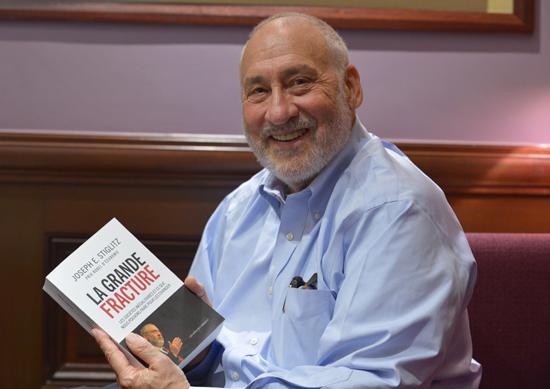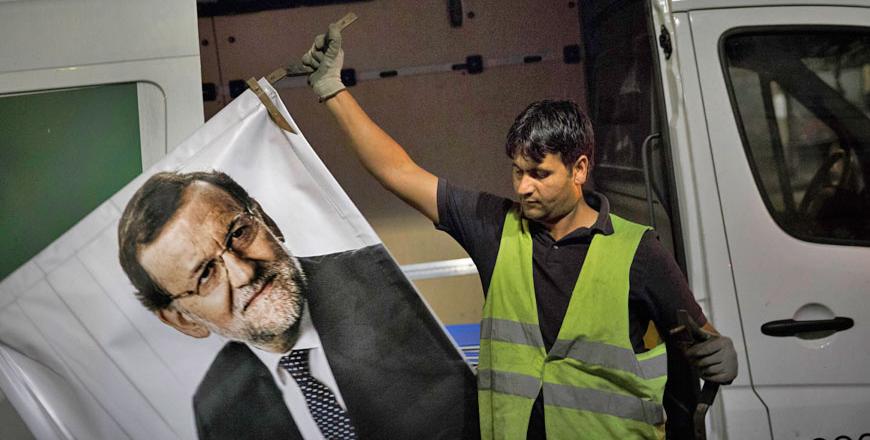You are here
Germany signals continuity of EU austerity drive
By AFP - Aug 26,2014 - Last updated at Aug 26,2014
MADRID — Germany strongly signalled Monday it will continue to push for fiscal austerity in Europe alongside Spain, even as France was thrown into political turmoil over its economic policy.
German Chancellor Angela Merkel praised Madrid's austerity drive during a visit to Spain and gave her powerful backing to the country's economy minister in his bid to lead the Eurogroup forum of finance ministers.
Merkel hailed Luis de Guindos' handling of the Spanish crisis, saying he was "an excellent economy minister in Spain in difficult times" during a joint press conference with Spanish Prime Minister Mariano Rajoy.
The German leader's support could be crucial in landing him the job, which would give the austerity policies favoured by Berlin a powerful defender in the European Commission.
Both Merkel and Rajoy, who have been allies in stabilising the finances of heavily indebted Spain, defended the need for further austerity and economic reforms, saying this boosted economic growth.
"The public deficit and debt levels must be reasonable," Rajoy told the news conference in his northwestern home city of Santiago de Compostela. "Structural reforms are sometimes hard, they are sometimes difficult and complicated to explain, but they boost economic competitiveness and levels of well-being and wealth and jobs."
Rajoy's government claims to have overseen something of a recovery in Spain's economy, which emerged last year from a double-dip recession sparked by a 2008 property crash.
"I share Mariano Rajoy's opinion regarding the combination of budget austerity and reforms," Merkel told the news conference.
The leaders' defence of austerity came as France lurched towards political turmoil after outgoing economy minister, Arnaud Montebourg, criticised Germany's austerity drive and warned Paris would no longer "be pushed around" by the European Union’s (EU) economic powerhouse.
This led French President Francois Hollande to instruct his Prime Minister Manuel Valls on Monday to form a new government.
France's economy is stalling and its central bank warned this month that Hollande had no hope of reaching his target of 1 per cent growth for 2014.
The French economy has been stagnant for the past six months and the government was forced to halve its growth forecast to 0.5 per cent for this year.
'Tightening is much weaker'
Germany earlier this month snubbed a request from Hollande for an EU-wide shift of economic policy in order to encourage growth.
Since the start of the eurozone debt crisis in 2010, Germany has faced accusations that by failing to use its standing as Europe's biggest economy to do more to kickstart growth, it is leaving struggling partners in the lurch.
But European markets and bonds shrugged off the upheaval in France, boosted by comments last week from European Central Bank (ECB) chief Mario Draghi who suggested recent monetary policy measures would get the eurozone back on its feet.
Hollande and Italian Prime Minister Matteo Renzi have been especially vocal in calling for an easing of the fiscal austerity imposed by Germany.
International Monetary Fund (IMF) chief Christine Lagarde, a former French finance minister, waded into the debate on Monday, saying in an interview that Germany should play a bigger role in propelling economic recovery in Europe.
"What I think is very important for Germany is to participate in the recovery movement in a very intense way. It has the means to do so," she told Swiss public broadcaster RTS.
"We have seen a process of very strong budget tightening over the past three years," she said, adding that "fortunately, in 2014 and 2015, this budget tightening is much weaker".
Describing the European economic recovery as "labourious", the head of the IMF stressed that the continent's economic powerhouse had "room for manoeuvre", as seen in recent wage negotiations.
"That leeway has been disclosed in the salary negotiations between the unions and the employers' organisations," she said, adding that "hopefully that movement will be amplified and will help propel the European recovery".
Last month, Bundesbank chief Jens Weidmann said that German wages had scope to rise by up to three per cent because "we are practically in a situation of full employment".
But this runs counter to many on the German right, including Chancellor Angela Merkel, who believe that low-wage policy has given the country its competitive edge.
But France, which remains mired in a stubbornly slow economic recovery, and other European states have argued that Berlin's big foreign trade surplus is hurting them.
Since the start of the eurozone debt crisis in 2010, Germany has faced accusations that by not using its standing as Europe's biggest economy to do more to kickstart growth, it is leaving struggling partners in the lurch.
On Saturday, Montebourg criticised German austerity measures and warned that France would no longer "be pushed around".
He told the Le Monde newspaper: "You have to raise your voice. Germany is trapped in an austerity policy that it imposed across Europe."
Related Articles
France's Socialist Prime Minister declared his love for companies and ally Germany Wednesday in a speech that earned him rapturous applause from the country's business elite following a damaging political crisis.
PARIS — France has been intimidated by Germany into pursuing an economic policy that isn't working, according to Nobel Prize winner economis
MADRID — Spain's Prime Minister Mariano Rajoy faced an uphill battle to stay in power on Monday after his conservatives lost their majority














